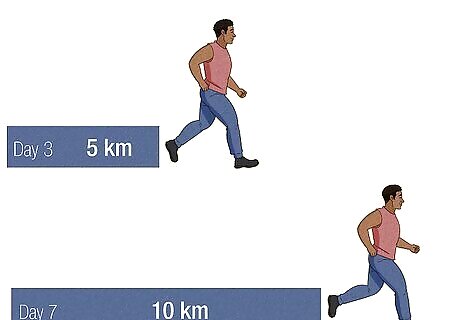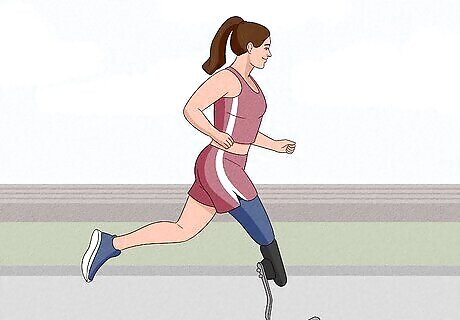
views
Ways to Change Your Mindset

Practice gratitude. Start by writing a gratitude list of perhaps 5 things that you're grateful for. Each day, strive to add another 5 things to that list. By continually searching for things to be grateful for, you'll start to automatically focus on the positive side of things that happen in your life, rather than the negative side. Remember that even though you might have little control over something that's happened in your life, you do have control over how you interpret and respond to that thing. For example, if you're having to deal with a difficult or toxic person, you might think about how grateful you are to have people in your life who are comforting and supportive.

Repeat positive affirmations daily. To create your own positive affirmation, think about something you struggle with and tell yourself the opposite. Repeat this affirmation to yourself 3 times a day for about 5 minutes at a time. For example, if you struggle with public speaking, you might create an affirmation like "I am intelligent and have important things to say." Watch out that you're not overly positive though—you have to believe your affirmation for it to work. Certified life coach Sydney Axelrod recommends positive affirmations as "another avenue of strengthening a new belief or a new perspective that's really supportive for you... it's just a practice of believing something that's more supportive about yourself." Love and transformation coach Jennifer Butler adds, "I always have an active and alive intention that I am using to help me stay focused on where I am going next. This intention helps me make choices and guides me to know what I need to learn and where I need to grow in my daily life as this intention becomes realized in my life."

Keep a journal. Journaling is a process that allows you to really examine how you think and feel about things that are happening in your life. The practice encourages you to dig deep and explore the inner beliefs you have and the stories you tell yourself so you can identify the problematic ones and work to change them. Start this practice by setting aside 5 to 10 minutes a day to just write about something that's on your mind. After you've written your journal entry, you might take another 5 to 10 minutes to reflect on what you've written.

Engage in mindfulness exercises. Through mindfulness, you start to do things consciously with intention, rather than going through life on autopilot. Starting a regular meditation practice is a great way to work toward becoming more mindful. The best part is this practice only takes a few minutes a day and can jumpstart big changes in your mindset and your life that you'll probably notice pretty quickly. Doing breathing exercises is a great way to pull yourself back into the present when you find yourself slipping out of mindfulness. You might also try yoga as a way to not only become more mindful but also become more in touch with your body.

Celebrate your strengths and your victories. If you find that you tend to focus more on what you did wrong than on what you did right, take a moment to flip the script. You might make a list of things you're proud of accomplishing or a list of things that you're really good at. Then, allow yourself to celebrate those things rather than constantly criticizing yourself for your perceived faults. Celebrating your strengths doesn't mean that you don't acknowledge your weaknesses. It just means that you see those weaknesses as opportunities for improvement rather than reasons you're not good enough.

Spend more time in nature. Growing or tending a garden, playing with animals, or just walking around outdoors can actually do some amazing things for your mind and body. These activities can boost your mood and improve your physical and mental health as well as help you feel more connected to all life around you. Even if you live in an urban area, you can still take advantage of parks and other open green spaces to commune with nature. You can also bring nature inside! For example, you might grow plants indoors or adopt an indoor pet.

Nurture your curiosity about people and the world. Having a fixed or negative mindset essentially means that you've closed yourself off to new information. Let go of any assumptions you might have and ask questions that help you better understand someone else's perspective. Then, allow yourself to internalize that perspective and learn from it to expand your own consciousness and view of the world. If you feel like this is going to be tough for you, start with small, relatively inconsequential things. For example, if a friend of yours likes a band that you're not too keen on, you might ask them what they enjoy most about that band or how the music makes them feel.

Establish a self-care routine that you love. Self-care includes exercising and eating nutritious foods, but it's about more than just taking care of your body. Create a self-care routine that also nourishes your soul and fills you with joy. Make room in your life for hobbies and activities that uplift, inspire, and empower you. Love and transformation coach Jennifer Butler notes that "we must love ourselves fiercely as we grow." Certified life coach Sydney Axelrod recommends "having a morning routine... something that's consistent every single day when you wake up" to help you "feel ready for the day."

Spend time with positive people. The people you surround yourself with can have a profound effect on your mindset. It's tough to think positively when everyone around you is negative and critical. Make an effort to cultivate your relationships with people who also have a positive mindset and you'll find they affirm and reinforce your most empowering thoughts about yourself. You can make an effort to be a positive force in others' lives as well. Start by offering genuine compliments when someone says or does something that impresses or inspires you. Let people know when you're grateful for their presence or when you learn something from them.

Live a more active lifestyle. If you exercise for at least 30 minutes a day on most days of the week, you'll naturally start to feel more positive and alert. Don't have room in your schedule to commit a large chunk of time? You can break it up into short, 5-minute bursts of activity. There are also ways that you can incorporate activity into your normal routine, such as parking further away from your destination so you can get some steps in, or taking the stairs instead of the elevator. If you've been living a more sedentary lifestyle, start small—a little activity can pay off in a big way! For example, if you don't think you can walk 5 flights of stairs to your office, you could start by walking up 2 flights and then taking the elevator the rest of the way.

Leave time for rest and relaxation. Rest and relaxation help you recharge mentally and physically so you're ready to take on the next task. If you're focused on productivity, you might consider this wasted time, but it's actually super-important for your overall well-being. Relax your mind and body by reading an entertaining book, taking a bubble bath, or cuddling with your pet. Certified life coach Sydney Axelrod cautions that "you can't pour from an empty cup. So what are you doing to actually refill your cup? Are you taking care of yourself? Are you getting enough sleep? Are you taking a break? Are you finding ways to unwind?" Axelrod further notes that "the idea of taking care of yourself so that you feel energized and focused and clear really makes a huge impact because if you try and take on too much and do too much all the time, you're just going to burn yourself out and there are going to be huge diminishing returns."

Set personal goals and visualize success. Use "SMART" goals that are specific, measurable, achievable, relevant, and time-based. Evaluate your progress and take a moment to imagine yourself doing whatever you've ultimately set out to accomplish. If you're able to see yourself reaching your goal, you'll feel more confident in your ability to do just that. Certified life coach Sydney Axelrod emphasizes that "it's really important to set goals but also get clear on what's your 'why' behind the goal." She notes that if you "kind of get clear on what the feeling is that you're cultivating... [you can] work on starting to embody some of those feelings now." Axelrod further advises that "you don't have to change everything for everything to change." She recommends "setting really small goals that [you] meet and can actually exceed, which is way more motivating, builds more confidence, and is much more sustainable in the long term."

See mistakes as learning opportunities. Learning from your mistakes so that you gain new knowledge and skills is an important part of the growth mindset. Every time you mess up, you have an occasion to figure out where you went wrong and what you need to do differently to keep that mistake from happening again in the future. Love and transformation coach Jennifer Butler advises that you tell yourself to "let go of the outcome and fall in love with the process, which means, first and foremost, that I love who I am, where I've been, and the bumpy road I may be taking to get where I'm going."

Learn something new every day. Jot down a list of topics you're interested in and try to learn something new about one of those topics each day to increase your knowledge and broaden your perspective. You might also research the lives of people who have different backgrounds or lifestyles than you do so that you can expand your consciousness and increase your empathy for other people. Learning is perhaps the quickest way to change your mindset. The more you learn and are open to learning, the more your mind and your skill set will grow.

Build your emotional intelligence. Emotional intelligence is simply how you recognize and manage your emotions to communicate and build stronger relationships with others. When you boost your empathy, it's much easier to see the good in people instead of focusing on the negative, which can help make you a more positive person overall. Learn to anticipate when you're close to getting overwhelmed so that you can take steps to pull back and better manage your emotions. Practice mindfulness to reconnect with your emotions and be more accepting and at peace with them.

Embrace change as an opportunity to grow. As you learn and grow, change is inevitable. This could mean major life changes, such as moving to a new city or starting a new job, but it could also be something as simple as starting a practice of doing yoga in the morning. Change can be difficult but it also offers you the perfect chance to learn more about yourself and what you're capable of. Certified life coach Sydney Axelrod notes that "no massive shifts or changes or growth or successes can really happen in your comfort zone," which means "leaning into that, leaning into your support system, leaning into your inner advocate and those more affirming parts of yourself, and just practicing getting comfortable being uncomfortable." Love and transformation coach Jennifer Butler cautions against "making decisions from a place of fear instead of taking the time to connect to your own inner guidance and then deciding from there."
What is a mindset?

Your mindset is a collection of assumptions that guide your expectations. It can help to think of your mindset as a series of patterns—this is the way you assume the world operates. Most people tend to have either a positive mindset or a negative mindset. For example, suppose you just lost your job. If you had a negative mindset, you might focus on all the bad things that are likely to happen now that you don't have any income. If you had a positive mindset, on the other hand, you might look at your new-found joblessness as an opportunity to find work that better suits you and reflects your personal values. Keep in mind that thinking positively doesn't mean that you never feel any negative emotions, such as sadness or anger. It just means that when these emotions do rise up, you know how to manage them healthfully and avoid getting pulled down by them.
Can you change your mindset?

Yes, it's totally possible to change your mindset. Those patterns of assumptions that you use to guide your expectations of what will happen aren't set in stone! The idea that your cognitive abilities and perspective can change is referred to as a "growth mindset." When you cultivate a growth mindset, you embrace the often messy process of growing and changing as a person. It might sound cheesy, but good things tend to happen to you more often when you expect good things to happen. With a positive mindset, your overall physical and mental health actually improve.
Benefits of a Positive Mindset

Better physical and psychological well-being When you adopt a more positive mindset, your mind and body follow suit. Over time, you'll find that you feel healthier and more physically fit, more alert, and less moody. These changes can become more or less permanent if you keep up with positive thinking. Studies have shown that people with a positive mindset have better cardiovascular health than people with a negative mindset.

Better coping skills in times of stress and hardship Having a positive mindset doesn't mean that nothing bad ever happens to you. What it does mean is that when bad things happen, you're better able to cope with them and come out the other side. You won't let a relatively minor negative event that happens ruin the rest of your day. Stress may also have less of a damaging effect on your body. With a positive mindset, you'll likely find that you don't get sick or rundown as often as a result of dealing with a stressful situation.

Better resilience When faced with a challenge, do you quickly bounce back and return to your path, or do you get derailed for an extended period? Having a positive mindset makes it a lot easier for you to get back in the saddle again without dwelling on roadblocks or letting them shove you off-course. A positive mindset also gives you more flexibility when you anticipate that something bad might happen. You can more easily figure out what you need to do to mitigate the damage (or avoid it entirely) so challenges don't impact you as much as they would if you had a more negative mindset.

Improved immune system and overall health Expanding research shows that positive thinking actually has a profound impact on your physical health and well-being. You'll get an immune system boost so that you're less likely to get sick and more likely to recover quickly when you do get sick. Self-affirmations and positive thinking can also help motivate you to make positive changes in your life, which definitely improves your health as well. For example, if you want to exercise more, you might use affirmations to tell yourself that you are capable of becoming fit and strong.




















Comments
0 comment